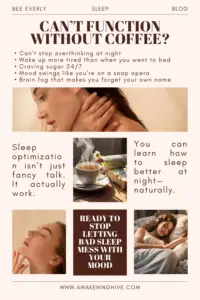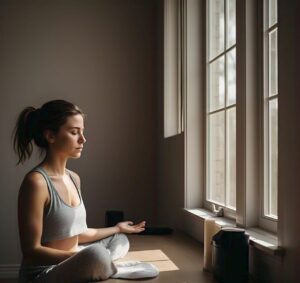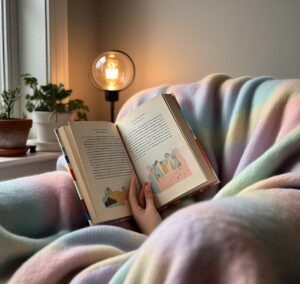Sleep optimization
Hey, busy bees… time to awaken the hive!
Sleep optimization—Counting sheep? More like counting all the life decisions that led you to this insomnia. Yeah, we’ve all been there — staring at the ceiling like it’s gonna give us the answers to life, love, and why Karen from HR is still so annoying.
Let me guess — you’re tired but wired, your brain’s throwing a rave at 2 AM, and no amount of “just relax” is helping. People keep saying sleep fixes everything, but they forget to tell us how to actually get it when our mind is busier than our social calendar during exam week. And hey — if you’ve ever said “I’ll sleep when I’m dead,” congrats, because you’re halfway there from burnout. But before you reach for that third cup of coffee and tell yourself sleep is “for the weak,” let me stop you right there —
What if I told you your whole vibe, from glowy skin to mental peace, depends on that shut-eye? You didn’t just click this blog by accident. Your body’s lowkey begging for a sleep glow-up — and honey, we’re about to give it main character energy. Let’s get into it — because beauty sleep? It’s not just for princesses anymore.
Sleep Optimization: How Quality Sleep Boosts Your Mental and Physical Health
Sleep is not just for rest—it’s nature’s most powerful healing tool. While you’re asleep, your body carries out essential tasks like
- Energy Restoration
- Hormone Balancing
- Immune Strengthening
- Memory Processing
In today’s fast-paced world, many people underestimate the importance of sleep. Lack of quality sleep can weaken your immune system, affect your emotions, and increase your risk of health problems.
Whether you’re dealing with low energy, hormonal imbalances, digestion issues, or sudden weight gain, better sleep could be the key you’ve been missing.
During sleep, your body and mind go through vital recovery phases—light sleep, deep sleep, and REM. These stages help you wake up feeling fresh, focused, and emotionally balanced.
According to the Sleep Foundation, adults need 7–9 hours of quality sleep each night for full mental and physical recovery.
Benefits of Quality Sleep:
- Boosts brain and memory function
- Naturally balances hormones (especially for women over 40)
- Improves digestion and gut health
- Reduces inflammation and body pain
- Enhances mood and emotional clarity


Even Luffy, mid-battle and all, takes a nap when he’s tired. Not because he’s weak—but because he knows he’ll be stronger when he wakes up. Be like Luffy. Rest when you need to, come back swinging when you’re ready. Your mind, your rules.
1. Nature’s Most Powerful Healing Tool

Sleep helps repair your body at every level.
While you’re asleep:
- Muscles rebuild
- Tissues repair
- Hormones reset
- Brain processes emotions and memories
Brain processes emotions and memories. A single night of deep sleep improves your ability to learn, make decisions, and fight infections. In contrast, sleep deprivation can cause mood swings, poor focus, and low energy.
2. Signs You’re Not Getting Enough Sleep

- You wake up tired, even after 7–8 hours
- Mood swings, anxiety, or emotional instability
- Trouble focusing or remembering things
- Craving sugar or unhealthy snacks late at night
- Frequent colds, fatigue, or a weak immune system
If you nodded at more than one of these, your body’s waving a red flag—it’s time to prioritize quality sleep.
3. Natural Tips to Improve Sleep Quality

- Maintain a consistent sleep schedule – Sleep and wake at the same time daily
- Limit screen time at night – Blue light affects melatonin, your sleep hormone
- Take magnesium supplements – Magnesium helps your body relax
- Use lavender oil – Diffuse it with dim lights to create a calm sleep environment
- Create a relaxing bedtime routine – Try light stretching, reading, or journaling
- Make your bedroom sleep-friendly – Keep it cool, dark, and quiet
- Avoid caffeine and heavy meals in the evening

Sleep doesn’t need to be a mystery. Just a few small changes can turn your nights from restless to restful.
4- Mind-Focus Exercises for Better Sleep

If your mind keeps racing at night, try these simple exercises to calm your brain:
4.1. Deep Breathing (1–2 minutes)
- Inhale for 4 seconds
- Hold for 4 seconds
- Exhale slowly for 6–8 seconds
- Repeat 4–5 times
4.2. 5-4-3-2-1 Grounding Technique
Focus on:
- 5 things you see
- 4 things you feel
- 3 things you hear
- 2 things you smell
- 1 thing you taste
4.3. Visualization
- Close your eyes and imagine a peaceful place like a forest or beach. Focus on colors, sounds, and scents.
4.4. Mindful Journaling
- Write down your thoughts or worries before sleep to clear your mind.

5. 7-Day Sleep Optimization Challenge

Want to sleep better? Try this fun challenge to create a peaceful sleep habit:
- Day 1: Set a fixed bedtime
- Day 2: No screens 1 hour before bed
- Day 3: Drink chamomile tea before sleep
- Day 4: Do light stretching or yoga
- Day 5: Use lavender oil or calming scents
- Day 6: Sleep in a cool, dark, and quiet room
- Day 7: Journal how you feel after these steps
I used to stay up late scrolling on my phone, thinking it was helping me relax. But instead, I often felt tired, moody, and had brain fog the next day. Once I fixed my sleep routine—by going to bed earlier and turning off screens at night—I felt a big difference. My energy, mood, and even my metabolism improved.
FAQs
Why can’t I sleep even when I’m tired?
Ugh, we’ve all been there. You’re u003cemu003ebone-tiredu003c/emu003e, but your brain is throwing a party. This is where u003cstrongu003esleep optimizationu003c/strongu003e swoops in. It’s not just about being tired—it’s about creating the u003cemu003erightu003c/emu003e routine and environment so your body u003cemu003ewantsu003c/emu003e to fall asleep. Think dim lights, a calming scent, and saying buh-bye to blue screens.
What are some natural sleep remedies that actually work?
No snake oil here—just real stuff. From magnesium to lavender oil to warm tea (and no, coffee doesn’t count), u003cstrongu003enatural sleep remediesu003c/strongu003e work u003cemu003eifu003c/emu003e you’re consistent. It’s like planting seeds—you need a little time before the calm kicks in. Trust the process. Sleep doesn’t ghost you forever.
How to sleep better at night naturally, without pills?
Short answer? Break up with your phone before bed. Long answer? A combo of u003cstrongu003enatural sleep remediesu003c/strongu003e, consistent routines, and mindset shifts. Your body u003cemu003ewantsu003c/emu003e to rest—you just have to stop confusing it. Try deep breathing, grounding techniques, or even journaling. You’d be surprised how healing “dear diary” can be.
Is bad sleep messing with my hormones and mood?
YES. It’s not just you being dramatic—poor sleep actually throws off your hormone balance and turns your mood into a rollercoaster. If you’re looking for a glow-up, start with u003cstrongu003esleep optimizationu003c/strongu003e. It’s the OG self-care move.
Can sleep really help with weight and digestion?
Absolutely. People forget that beauty sleep isn’t just about skin. Your gut, your metabolism, even your cravings are tied to your sleep cycle. So yes—u003cstrongu003esleep optimizationu003c/strongu003e is u003cemu003eyour secret weaponu003c/emu003e for that natural balance. Bonus: You’ll wake up less bloated and more Beyoncé.
Can stress really affect my weight loss?
u0022When the going gets tough, the tough get going,u0022 but stress can throw a wrench in your plans. Stress causes the body to produce more cortisol, making it harder to shed fat. Healthy weight loss tips for women include finding ways to manage stress—think meditation, yoga, or a good night’s sleep!
What’s the best time to sleep for real results?
You’ve probably heard “early to bed, early to rise,” and honestly—it holds up. The golden window is between u003cstrongu003e9 PM to 11 PMu003c/strongu003e. It’s when your body does its deep-healing. If you want to know u003cstrongu003ehow to sleep better at night naturallyu003c/strongu003e, don’t fight your body clock. Sync with it.
Can I actually train myself to fall asleep faster?
Yes! Your brain’s not a lost cause, promise. With the right habits—cue u003cstrongu003enatural sleep remediesu003c/strongu003e, relaxing night routines, and cutting back on caffeine—you’re basically hacking your own system. That’s the real tea on u003cstrongu003ehow to sleep better at night naturally.u003c/strongu003e
Is it okay to nap during the day?
A power nap? Chef’s kiss. But marathon naps? Not so much. If you nap too long, it could mess with your sleep cycle. Remember, the goal is u003cstrongu003esleep optimizationu003c/strongu003e, not “accidentally-slept-through-my-evening.” Keep it cute and quick—20–30 minutes max.
I’ve tried everything… Why am I still not sleeping well?
Okay, real talk—sometimes you need to audit your whole sleep routine. Maybe it’s stress, maybe it’s your phone addiction, or maybe you’re skipping all the u003cstrongu003enatural sleep remediesu003c/strongu003e and hoping Netflix will knock you out. (Spoiler: It won’t.) If nothing’s working, it’s time to try a new game plan with u003cstrongu003esleep optimizationu003c/strongu003e as your MVP.
Got more questions? Drop them in the comments—let’s about natural sleep remedies!
They say, “You can’t pour from an empty cup”—but let’s be honest, we’ve all tried. Scrolling through TikTok at 2 AM, convincing ourselves “one more video won’t hurt.” Spoiler alert: it always does. But here’s the tea—sleep isn’t just beauty rest, it’s a power move. It’s your brain’s way of saying, “I’ve got this—if you just give me 8 hours in peace.”
So if you’ve been waking up with a side of chaos and a dash of brain fog, maybe—just maybe—it’s not Mercury in retrograde. It’s your body begging for a little TLC and a lot less doom-scrolling. And honey, don’t feel guilty for choosing rest over the hustle. Trust me, the real glow-up? Starts with lights out and WiFi off.
Pillow talk’s fun, don’t stop at sleep—your mornings matter too. Here’s how to start your day with a mindset that actually works. No more blah o’clock energy.
So, are you going to try the 7-Day Sleep Optimization Challenge? Drop in the comments. Catch you on the dreamier side of life.
Buzzing off for now—BBZZ, Awakening Hive
Disclaimer:
Psst! Just so you know—some links in this post are affiliate links, which means I may earn a small commission if you decide to buy (at no extra cost to you). I only recommend stuff I’d genuinely want in my own calm-down toolkit. Because you deserve better than a cluttered mind.







